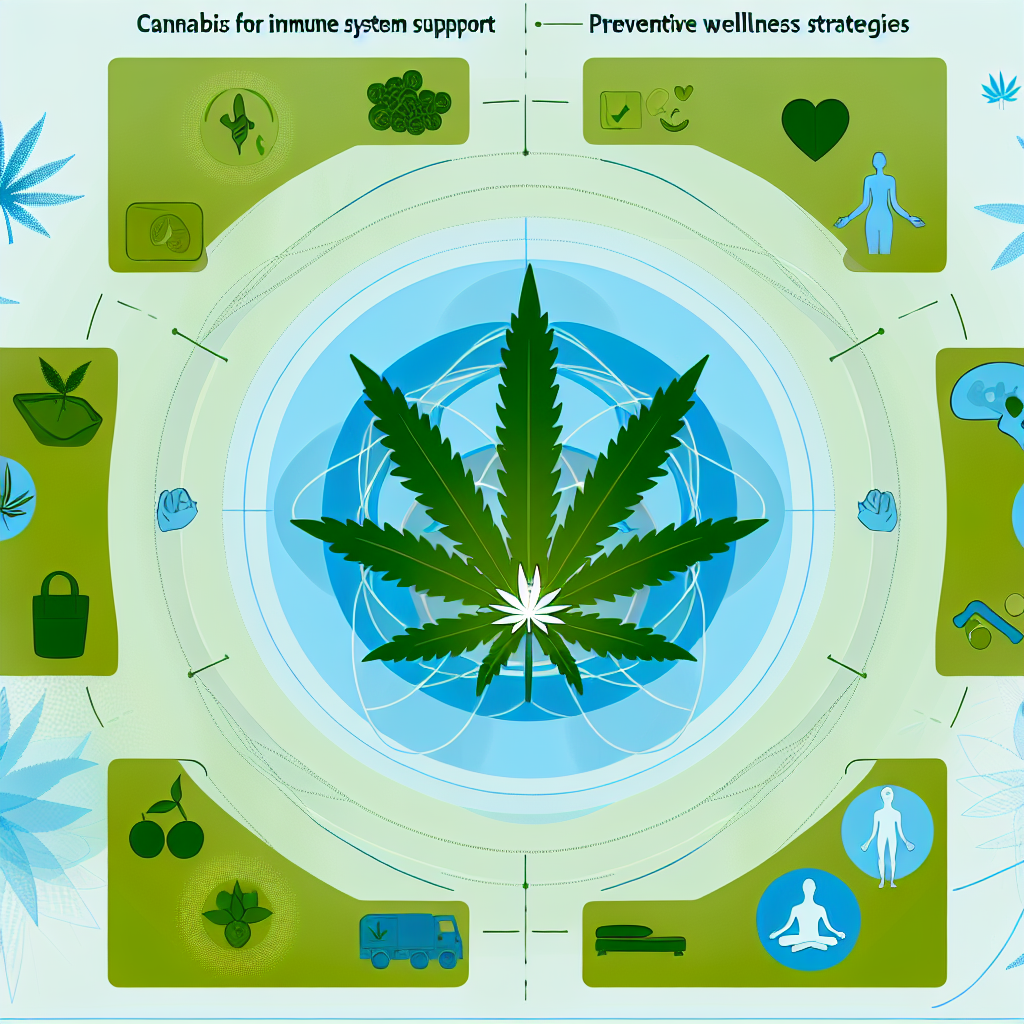**Cannabis for Immune System Support: Preventive Wellness Strategies**
Cannabis for Immune System Support: Preventive Wellness Strategies
As health awareness grows globally, more individuals are turning toward holistic and natural strategies to support their body’s defenses—especially when it comes to immune health. The recent pandemic underscored the value of prevention over treatment, spurring interest in natural immune-boosting tools. Emerging as a notable contender in this wellness revolution is cannabis—long known for its therapeutic potential and now gaining attention for its potential to modulate and support the immune system.
The endocannabinoid system (ECS)—a biological network discovered in recent decades—plays a key role in maintaining homeostasis, including immune responses. Cannabinoids such as cannabidiol (CBD) and tetrahydrocannabinol (THC) interact with ECS receptors found across immune-related cells, suggesting a direct link between cannabis use and immune regulation.
Today, consumers and cannabis professionals are exploring these immune-modulating effects not just as treatments for conditions like multiple sclerosis or arthritis, but also as preventative tools. From full-spectrum CBD oils and cannabinoid-rich edibles to topicals and adaptogenic blends, wellness-focused cannabis products aim to reduce inflammation, support better sleep, and fortify the immune system naturally.
In this article, we dive into the science behind cannabis and immune health and offer insight into how cannabinoids can be responsibly integrated into preventive health routines.
Scientific Foundations: How Cannabis Interacts with the Immune System
Despite ongoing research barriers, scientific interest in cannabis and its effects on immune health is accelerating. At the center of this interest is the endocannabinoid system (ECS), which features two main receptors: CB1, prevalent in the central nervous system, and CB2, primarily found in immune cells.
CB2 activation has shown powerful immune-modulating capabilities. According to research in *Frontiers in Immunology*, when cannabinoids like CBD bind to CB2 receptors, they may reduce pro-inflammatory cytokine production while increasing anti-inflammatory markers. This balancing effect helps the body maintain immune homeostasis ([Source](https://www.frontiersin.org/articles/10.3389/fimmu.2018.00200/full)).
CBD, in particular, has been recognized for its non-intoxicating, therapeutic benefits. A 2020 review from *Cannabis and Cannabinoid Research* found that CBD suppresses T-cell function and cytokine production—processes central to autoimmune disease progression ([Source](https://www.liebertpub.com/doi/10.1089/can.2019.0062)). This suggests CBD may be valuable in managing autoimmune conditions like lupus or rheumatoid arthritis.
Cannabis is also rich in antioxidants. Its compounds have been classified as “neuroprotective antioxidants” by a report in the *Proceedings of the National Academy of Sciences* ([Source](https://www.pnas.org/doi/10.1073/pnas.98.5.837)). These properties contribute indirectly to immune resilience, particularly by mitigating oxidative stress—often a root cause of weakened immunity and chronic illness.
CBD, Sleep, and Stress Reduction: Indirect Immune Support
Beyond direct immune modulation, cannabis contributes to immune defense through its effects on two essential wellness pillars: sleep and stress.
Chronic stress triggers elevated cortisol levels, which can suppress immune function over time. CBD and other cannabinoids have demonstrated potential in balancing cortisol and improving quality of rest. A study published in *Current Psychiatry Reports* showed that cannabinoids can reduce cortisol and enhance subjective sleep quality, offering an indirect but important layer of immune defense ([Source](https://pubmed.ncbi.nlm.nih.gov/28129550/)).
When combined, the anti-inflammatory, antioxidant, stress-reducing, and sleep-enhancing qualities of cannabis position it as a multi-dimensional tool for immune support.
Safety First: Personalizing Cannabis for Preventive Wellness
While cannabis offers promising mechanisms for immune support, it’s essential to approach its use with care and professional guidance. This is particularly critical because while immune suppression may help with autoimmune diseases, it could increase infection risk in healthy individuals if not applied properly.
Cannabis professionals and healthcare providers should consider:
– Type of cannabinoid (CBD vs. THC)
– Delivery method (oral, topical, inhalation, etc.)
– Dosage and frequency
– Strain selection
– Overall health and lifestyle factors
Customizing usage based on these factors can optimize results while minimizing potential downsides.
Looking Ahead: Cannabis and the Future of Immune Wellness
With continued advancements in cannabinoid science, cannabis is evolving from its stigma-laden past into a legitimate contributor to preventive healthcare. Whether it’s included in a daily wellness routine or used in combination with functional health supplements like vitamin C, probiotics, or medicinal mushrooms, cannabis holds promise as part of a holistic immune defense system.
As research continues to unravel the immune-enhancing capabilities of cannabinoids, both cannabis professionals and conscious consumers are encouraged to stay informed and cultivate a personalized relationship with this powerful plant.
**Concise Summary:**
This article explores how cannabis and its active compounds, such as CBD and THC, can support immune health through direct and indirect mechanisms. The endocannabinoid system plays a key role in regulating immune responses, and research suggests cannabis may help reduce inflammation, improve sleep, and manage stress – all of which contribute to a stronger immune system. The article also emphasizes the importance of personalizing cannabis use under professional guidance to optimize benefits and minimize potential risks.
**References:**
1. Frontiers in Immunology – Cannabinoid Receptor 2 and Immune Regulation
https://www.frontiersin.org/articles/10.3389/fimmu.2018.00200/full
2. Cannabis and Cannabinoid Research – Effect of Cannabidiol on Immune Responses
https://www.liebertpub.com/doi/10.1089/can.2019.0062
3. Proceedings of the National Academy of Sciences – Cannabinoids as Neuroprotective Antioxidants
https://www.pnas.org/doi/10.1073/pnas.98.5.837
4. Current Psychiatry Reports – Cannabinoids and Sleep Improvement
https://pubmed.ncbi.nlm.nih.gov/28129550/




